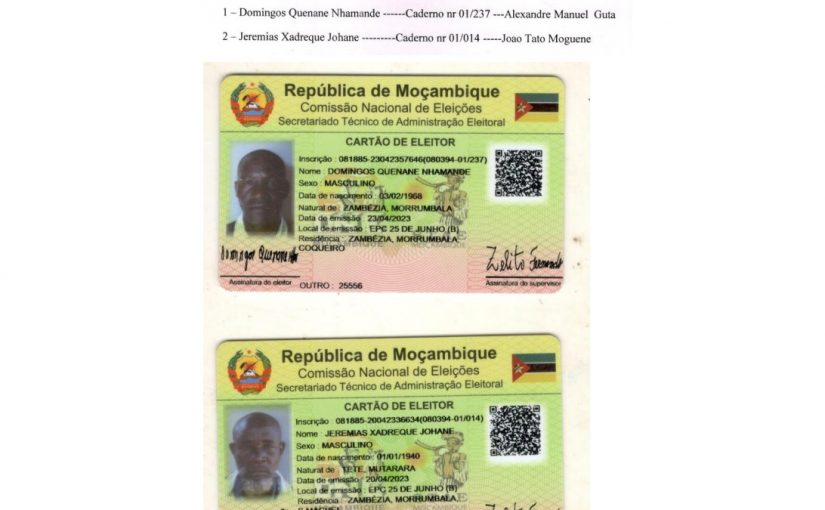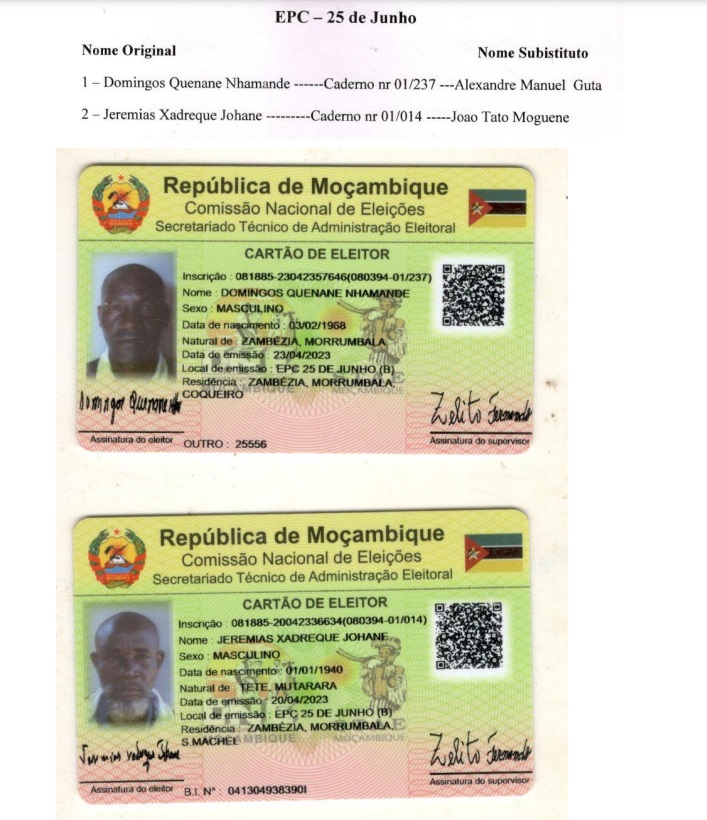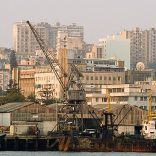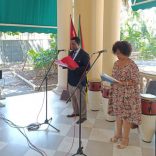Mozambique: Mondlane says has information that he will be arrested upon his return from Europe - ...
CIP Mozambique Elections: Renamo names taken off electoral roll

Image: CIP
Renamo says 120 names taken off electoral roll in Morrumbala
A Renamo delegate in Morrumbala, Zambézia, was arrested Friday after protesting that at least 120 names of Renamo members have been replaced on the electoral roll by other people. Artur Singano Lampião is representative for Renamo in Majoão neighbourhood. Police accuse him of mobilizing Renamo member to verify their registration after the official date to do this. He is still detained.
Renamo obtained an up-to-date copy of the roll, and checked to see if its members were on the list, and so far has found the 120 members have been removed from the voters roll. Renamo has provided a list of the people removed and the names of their replacements.
Below is an excerpt from the Renamo list of replaced names on the register for polling stations at 25 de June primary school (original name, left, and substitution name, right) and below are the voters cards for those two people. On the first line of the card, in brackets, is the registration post (the school) number, then register book number (01), and then the card number.

Explainer
Importance of collecting and recording voters cards
STAE confirms that anyone with a voters card can vote, even if their name is not in the register book. So, in principle, these people in Morrumbala, can still vote. But the practice is different.
Frelimo has been accused not just of manipulating the voters rolls, but also of naming key polling station presidents (heads). Thus when these people present their card, the head may simply say you cannot vote because you are not on the roll, or because someone with that card number has already voted. In practice, it will be very hard to challenge the polling station president.
The other issue in past elections and again this year is local officials and Frelimo people either collecting cards or taking down names and card numbers. Without cards people can still vote if they have identification and are on the list, but many people do not know that, so if they have handed in their card they will not vote.
When people vote, their name is ticked in the electoral role, creating a count that should match the ballot papers in the box. A common fraud we have reported in previous election is in the mid-afternoon when the polling station is quiet and no one is watching, these lists are used to tick off those names of people who have not voted. Sometimes extra ballot papers with votes for Frelimo are put into the box. Alternatively the extra votes for Frelimo are added when the final result sheet (known as the edital) is written. In either case, Frelimo is given the votes of people whose names and numbers have been collected, but have not voted. Frelimo may argue that we know they meant to vote for us, but did not have time to come and vote. The president or someone from Frelimo makes sure that the numbers of the final edital add up correctly, and that the number of people said to have voted includes the extra “ghost” voters.
These frauds are only possible if observers or party delegates are not watching. But in mid-afternoon they usually take a break. And during the count, observers and party delegates often do not keep a record of the actual vote, so they do not notice that the edital is different.
- Death threat against Frelimo defector
Death threats have been made against a former Frelimo member, João Ibraimo Iayaia, who recently joined Renamo. He reported that on Saturday (30 September) when he was going home after campaigning for his new party, he found a group of people at his house, headed by the head of block 36, the secretary of the Frelimo branch, and other Frelimo members dancing and throwing stones into his house. He immediately went to a nearby police station to lodge a complaint. On Sunday morning (1 October) he found a letter at his gate bearing death threats against him and all his children.
Meanwhile Renamo tried to attack the chair of the motor-cycle taxi association in Manica city. Renamo claims chair Neto Isaías Chigandanda had photographed the number plates of the motor-cycles that were on the Renamo motorcade, and mobilised members of the association to participate in the election campaign in support of Frelimo.
- Campaigning remains peaceful with little violence
Campaigning has largely remains calm. The only reported incidents of violence on Saturday were two serious skirmishes between Frelimo and Renamo supporters in Ulongue, Tete, with injuries on both sides.
Indeed, there were more reports of police peacefully intervening to prevent confrontations between opposing supporters. For example between Frelimo and Pahumo in Nacala-Port, and between Frelimo and Nova Democracia in Chokwé, Gaza.
In Moatize, Tete, and in Tete City, Renamo tried to attack the Frelimo headquarters but police intervened.
In Vilankulo Frelimo sent a letter to the police requesting authorisation for amarch on Saturday along the same route, and at the same time, where Renamo had already been authorized to hold a procession. The district police command refused the Frelimo request and suggested and approved another route.
In Chiure, Cabo Delgado, plans by two parties to hold rallies in Milamba neighbourhood at the same time were resolved peacefully, and by agreement one rally was delayed.
- Frelimo using state vehicles in Matola, Chókwè and Vilanculo
Illegal use by the ruling party of state vehicles in the campaign continues. In Matola on Saturday (30 September) in the market in Malhampsene neighbourhood the CIP Eleições Bulletin witnessed the use of two buses belonging to the Matola Municipal Transport Company (EMTP) with the number plates ALG 410 MC and ALG 451 MC and a Toyota Coaster belonging to the Portos da Matola company, with the number plate AJF 455 MC. The vehicles and their drivers belong to the State, and they were carrying supporters of Frelimo in the campaign. There were also two high performance Nissan vehicles with their number plates hidden.
A similar situation was reported in Chókwè, where Frelimo is using State vehicles, but hiding their number plates. In Vilankulo, on Saturday the vehicle of the Vilankulo district secretariat was being used for the Frelimo parade.
In Tete city two municipal tank wagons were providing water to spectators at a Frelimo “showmicio” (a rally – comício – with music).
In Brief
- In Massinga, Inhambane, Renamo on Friday accused Frelimo of buying Renamo t-shirts from supporters and then burning the Renamo t-shirts. Giving away free party t-shirts have always been part of the campaign, and protests were reported in several places where Frelimo failed to hand out t-shirts.
- The lack of MDM propaganda material in Massinga could compromise the MDM campaign. According to the head of the MDM list, Verdiano Massingue, leaflets, T-shirts and caps, etc. are still on board a ship in Beira port.
- Parties in Gurue and Maganja da Costa, Zámbezia, continue to prevent observation. Renamo in Matola continues to be accused of giving false information to observers.













Leave a Reply
Be the First to Comment!
You must be logged in to post a comment.
You must be logged in to post a comment.